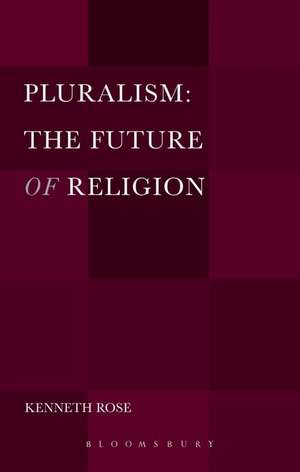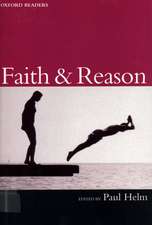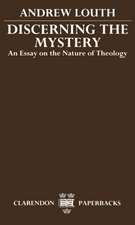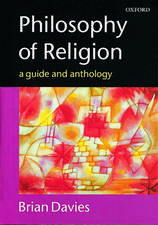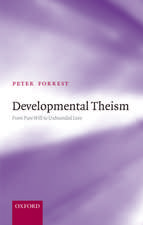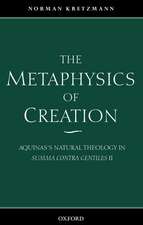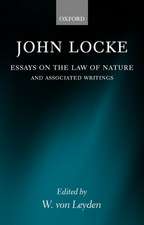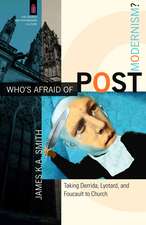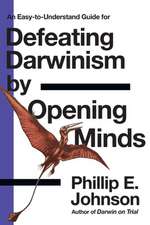Pluralism: The Future of Religion
Autor Professor Kenneth Roseen Limba Engleză Paperback – 22 oct 2014
| Toate formatele și edițiile | Preț | Express |
|---|---|---|
| Paperback (1) | 255.76 lei 6-8 săpt. | |
| Bloomsbury Publishing – 22 oct 2014 | 255.76 lei 6-8 săpt. | |
| Hardback (1) | 772.17 lei 6-8 săpt. | |
| Bloomsbury Publishing – 22 mai 2013 | 772.17 lei 6-8 săpt. |
Preț: 255.76 lei
Preț vechi: 294.49 lei
-13% Nou
Puncte Express: 384
Preț estimativ în valută:
48.96€ • 53.19$ • 41.15£
48.96€ • 53.19$ • 41.15£
Carte tipărită la comandă
Livrare economică 21 aprilie-05 mai
Preluare comenzi: 021 569.72.76
Specificații
ISBN-13: 9781628925265
ISBN-10: 1628925264
Pagini: 208
Dimensiuni: 152 x 229 x 11 mm
Greutate: 0.28 kg
Editura: Bloomsbury Publishing
Colecția Bloomsbury Academic
Locul publicării:New York, United States
ISBN-10: 1628925264
Pagini: 208
Dimensiuni: 152 x 229 x 11 mm
Greutate: 0.28 kg
Editura: Bloomsbury Publishing
Colecția Bloomsbury Academic
Locul publicării:New York, United States
Caracteristici
A
theologically
and
philosophically
informed
defense
of
the
inevitability
of
religious
pluralism.
Notă biografică
Kenneth
Roseis
Professor
of
Philosophy
and
Religious
Studies
at
Christopher
Newport
University,
Virginia,
USA.
He
has
taught
at
the
University
of
Virginia,
the
University
of
Richmond,
and
the
University
of
Massachusetts.
He
holds
an
M.Div.
from
Harvard
University
Divinity
School
and
an
M.A.
and
Ph.D.
in
the
Study
of
Religion
from
Harvard
University.
At
Harvard,
he
was
a
Fellow
at
the
Center
for
the
Study
of
World
Religions.
He
is
the
author
ofKnowing
the
Real:
John
Hick
on
the
Cognitivity
of
Religions
and
Religious
Pluralism(1997)
and
has
published
numerous
academic
articles
and
reviews.
Cuprins
1.
Impasse
in
Theology
of
Religions
2.
The
Copernican
Revolution
and
Counterrevolution
in
Theology
of
Religions
3.
The
Prisoners'
Parable
4.
Pluralism
in
the
Upani?ads
5.
Pluralism
in
the
New
Testament
6.
Charting
an
Apophatic
Pluralism
Bibliography
Index
Recenzii
Kenneth
Rose'sPluralism:
The
Future
of
Religionis
one
of
the
most
important
works
to
appear
in
the
theology
of
religions
in
nearly
two
decades.
Evocatively
written,
rhetorically
effective,
deftly
argued,
remarkably
lucid,
theologically
nuanced,
and
even
spiritually
discerning,
the
book
launches
a
full-scale
attack
on
exclusivistic
and
inclusivistic
versions
of
"particularism,"
the
view
that
one
particular
religion
is
absolute,
universal,
unsurpassable,
and
superior
to
all
the
others
.
I
cannot
recommendPluralism:
The
Future
of
Religionstrongly
enough.
In writing this clear and forceful volume, argued with a philosophical and religious fervor, Kenneth Rose is on a mission, marshaling support for his prophecy that pluralism is on its way to becoming the only intellectually coherent explanation of religious diversity. . I recommend this passionate book as worthy reading for those interested in refreshing and intensifying the debate on the significance of our many religions.
A bold, fullthroated apologia for what is called a pluralist theology of religions. ... For those who see pluralism as 'the future of religion,' Rose's book will be a solid buttress. For those who don't, it is an argument that they will definitely have to contend with.
Rose's work is a welcome addition to the new life that is being poured into the pluralist position that is clearly here to stay.
In this passionate and erudite book, Rose mounts a forceful defense of pluralism... The book debunks all criticism against pluralism and asserts that it is the only viable model for our globalized world... Rose has written a remarkable scholarly book on one of the most debated topics in the study of religion, which is likely to draw much scholarly attention. The pluralist position is here to stay!
Reviewed.
I am inclined to agree with Kenneth Rose's claim that the future is already decided, as the title of is recent book reflects:Pluralism: The Future of Religion.Rose argues persuasively, both philosophically and historically, that of the tripartite division that Race devised more than thirty years ago, exclusivism is alreadypasse, except for now numerically expanding but intellectually ineffectual fundamentalist groups, and inclusivism is experiencing increasing intellectual abandonment.
The book is logically structured and readable ... The reader is afforded a useful overview of past and present 'comparative theology' discourse, and in this sense can serve as a useful introduction to the topic. [T]he discussion is engaging and interesting.
Pluralism: The Future of Religionis the most thorough and up-to-date study of one of the most hotly debated issues in Religious Studies today. Rose deals fairly and squarely with the large amount of recent writings... and convincingly argues for a pluralistic approach to world religions... an ideal text for graduate seminars for advanced students of religion and is certain to generate a lively debate among scholars.
[A] rigorous and nuanced study that is exceptionally well written, illuminating, and contains impeccable scholarship... It has the special feature of drawing from the depths of the classical Hindu texts of the Upanishads in his powerful constructive vision for a genuine religious pluralism. I applaud Rose especially for engaging Eastern textual sources and conceptions for his vision of pluralism.
Rose in this penetrating study brilliantly clarifies the dialogue among religious advocates of the now "classical" exclusivist, inclusivist, pluralist understandings of religion... This tour de force should be read and reflected on by everyone interested in religion.
In writing this clear and forceful volume, argued with a philosophical and religious fervor, Kenneth Rose is on a mission, marshaling support for his prophecy that pluralism is on its way to becoming the only intellectually coherent explanation of religious diversity. . I recommend this passionate book as worthy reading for those interested in refreshing and intensifying the debate on the significance of our many religions.
A bold, fullthroated apologia for what is called a pluralist theology of religions. ... For those who see pluralism as 'the future of religion,' Rose's book will be a solid buttress. For those who don't, it is an argument that they will definitely have to contend with.
Rose's work is a welcome addition to the new life that is being poured into the pluralist position that is clearly here to stay.
In this passionate and erudite book, Rose mounts a forceful defense of pluralism... The book debunks all criticism against pluralism and asserts that it is the only viable model for our globalized world... Rose has written a remarkable scholarly book on one of the most debated topics in the study of religion, which is likely to draw much scholarly attention. The pluralist position is here to stay!
Reviewed.
I am inclined to agree with Kenneth Rose's claim that the future is already decided, as the title of is recent book reflects:Pluralism: The Future of Religion.Rose argues persuasively, both philosophically and historically, that of the tripartite division that Race devised more than thirty years ago, exclusivism is alreadypasse, except for now numerically expanding but intellectually ineffectual fundamentalist groups, and inclusivism is experiencing increasing intellectual abandonment.
The book is logically structured and readable ... The reader is afforded a useful overview of past and present 'comparative theology' discourse, and in this sense can serve as a useful introduction to the topic. [T]he discussion is engaging and interesting.
Pluralism: The Future of Religionis the most thorough and up-to-date study of one of the most hotly debated issues in Religious Studies today. Rose deals fairly and squarely with the large amount of recent writings... and convincingly argues for a pluralistic approach to world religions... an ideal text for graduate seminars for advanced students of religion and is certain to generate a lively debate among scholars.
[A] rigorous and nuanced study that is exceptionally well written, illuminating, and contains impeccable scholarship... It has the special feature of drawing from the depths of the classical Hindu texts of the Upanishads in his powerful constructive vision for a genuine religious pluralism. I applaud Rose especially for engaging Eastern textual sources and conceptions for his vision of pluralism.
Rose in this penetrating study brilliantly clarifies the dialogue among religious advocates of the now "classical" exclusivist, inclusivist, pluralist understandings of religion... This tour de force should be read and reflected on by everyone interested in religion.
